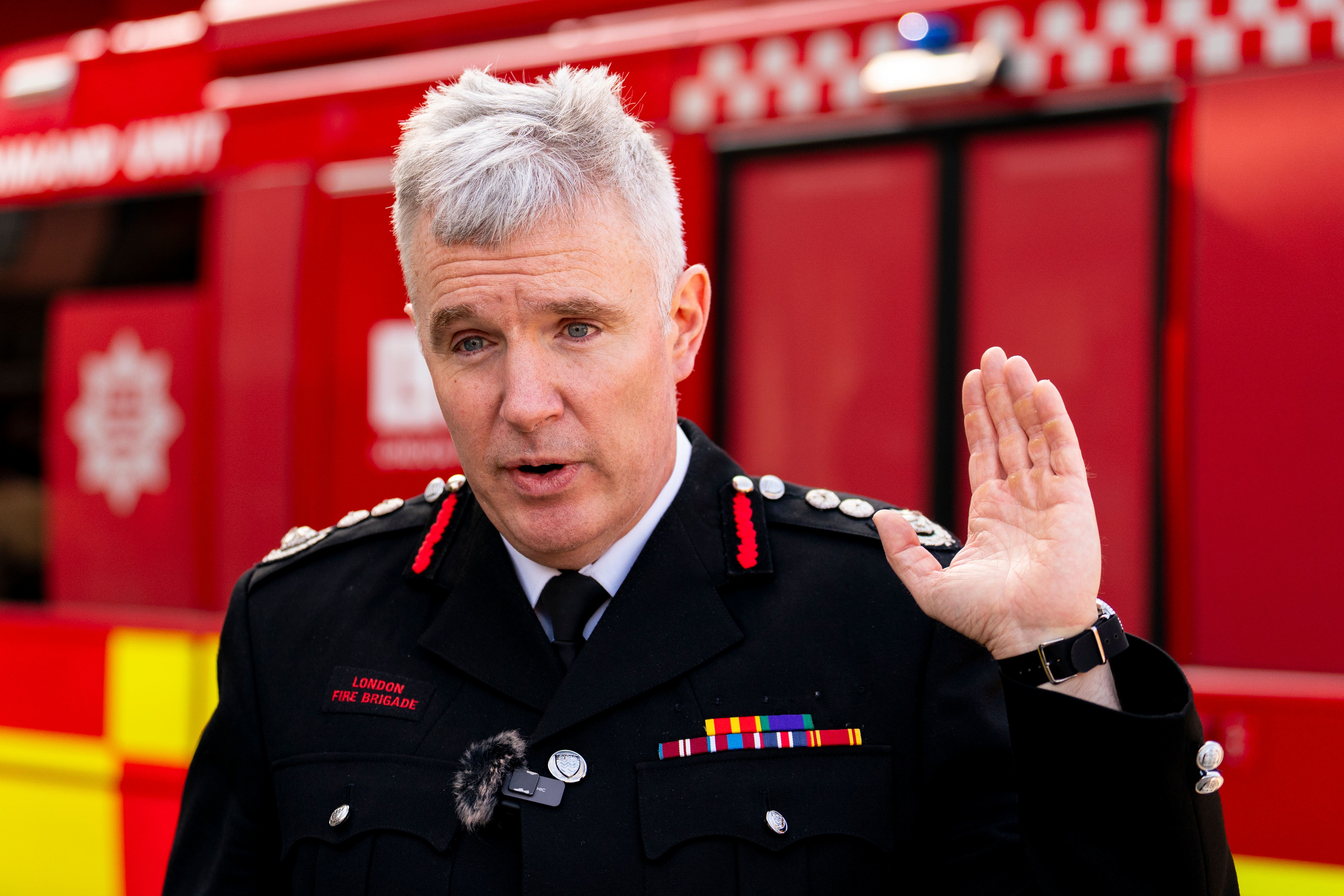London Fire Brigade completes Grenfell Inquiry first phase recommendations
Fire commissioner Andy Roe said the brigade’s response to an emergency like that of the 2017 west London blaze would now be ‘so different’.

Your support helps us to tell the story
From reproductive rights to climate change to Big Tech, The Independent is on the ground when the story is developing. Whether it's investigating the financials of Elon Musk's pro-Trump PAC or producing our latest documentary, 'The A Word', which shines a light on the American women fighting for reproductive rights, we know how important it is to parse out the facts from the messaging.
At such a critical moment in US history, we need reporters on the ground. Your donation allows us to keep sending journalists to speak to both sides of the story.
The Independent is trusted by Americans across the entire political spectrum. And unlike many other quality news outlets, we choose not to lock Americans out of our reporting and analysis with paywalls. We believe quality journalism should be available to everyone, paid for by those who can afford it.
Your support makes all the difference.London Fire Brigade (LFB) has completed all recommendations made to it by the first stage of the Grenfell Tower Inquiry as its chief fire officer said the change is “owed” to the bereaved and survivors of the tragedy.
London fire commissioner Andy Roe insisted the brigade’s response to an emergency like that of the 2017 west London blaze, in which 72 people died, would be “so different” today.
The recommendations were made in October 2019 and the last one – which involves new breathing apparatus sets – comes into force on Wednesday.
Mr Roe called the completion a “very significant milestone” which has made “hundreds of thousands of Londoners” living in blocks safer.
Speaking at Old Kent Road fire station in south-east London, he told the PA news agency: “As much as today is about us completing those recommendations, it’s also about recognising the loss and the pain of the bereaved and the survivors, and making a promise to them that this change … is owed to them.
“We owe it to them to keep on listening, to keep on learning, to keep on making that change.”
He said there are two high-rise fires a day in London and that one of the scale of the Grenfell Tower blaze could happen again in the capital, citing a remaining 1,250 blocks that are still clad or have “very serious deficiencies”.
“What is different is our response,” Mr Roe told PA.
“Our response is so different that I am confident that at the earliest point my colleagues, these fantastic officers and crews, would recognise the danger signs and would do everything to get people safely out that block.”
He insisted the LFB is in a position to assure itself, and the public, that it would handle a similar incident better than it did nearly seven years ago.
“We can point to multiple real-life examples of where we’ve responded to very challenging incidents that if we hadn’t responded in a different way could have developed into the most tragic sort of incident you can imagine,” the fire commissioner said.
“We have rescued hundreds of Londoners as a result.”
He said the changes made in the service have “already saved hundreds of lives” as procedures and improvements have been implemented on an ongoing basis since 2020.
Mr Roe continued: “My promise, though, to anyone … and particularly the bereaved and the survivors, is that doesn’t mean we’ve ticked a box and the job is done.
“This place is always changing. This amazing city is always changing. We have to change all the time too in response to that.”
Mr Roe said the biggest change implemented in the LFB is the training given to firefighters to recognise when a building might be failing and, “at the earliest point”, lead an emergency evacuation to save lives.
This involved a recommendation around managing a transition from a “stay put” instruction to “get out”.
In 2019, Sir Martin Moore Bick, chairman of the Grenfell Inquiry, suggested there would have been fewer fatalities if the LFB and 999 operators had reversed the strategy to tell residents to stay in their flats sooner.
The instruction remained for nearly two hours after the blaze broke out at just before 1am, until 2.47am.
On that subject, Mr Roe told PA: “What we do now is we enable our control room, and our firefighters on the ground, to take a decision, only in an incident if stay put is not going to work, to end that, make sure residents are told that through the control room, but also firefighters on the ground immediately commence an emergency evacuation to get people out.”
The commissioner was hopeful the changes have and will continue to increase public confidence in the service, but said Londoners are the judge of that.
Mr Roe pledged to adopt the same listening approach to the second phase of the inquiry, saying the service has worked to anticipate what might come and feels prepared for it.
He insisted he felt confident in the LFB going forward.